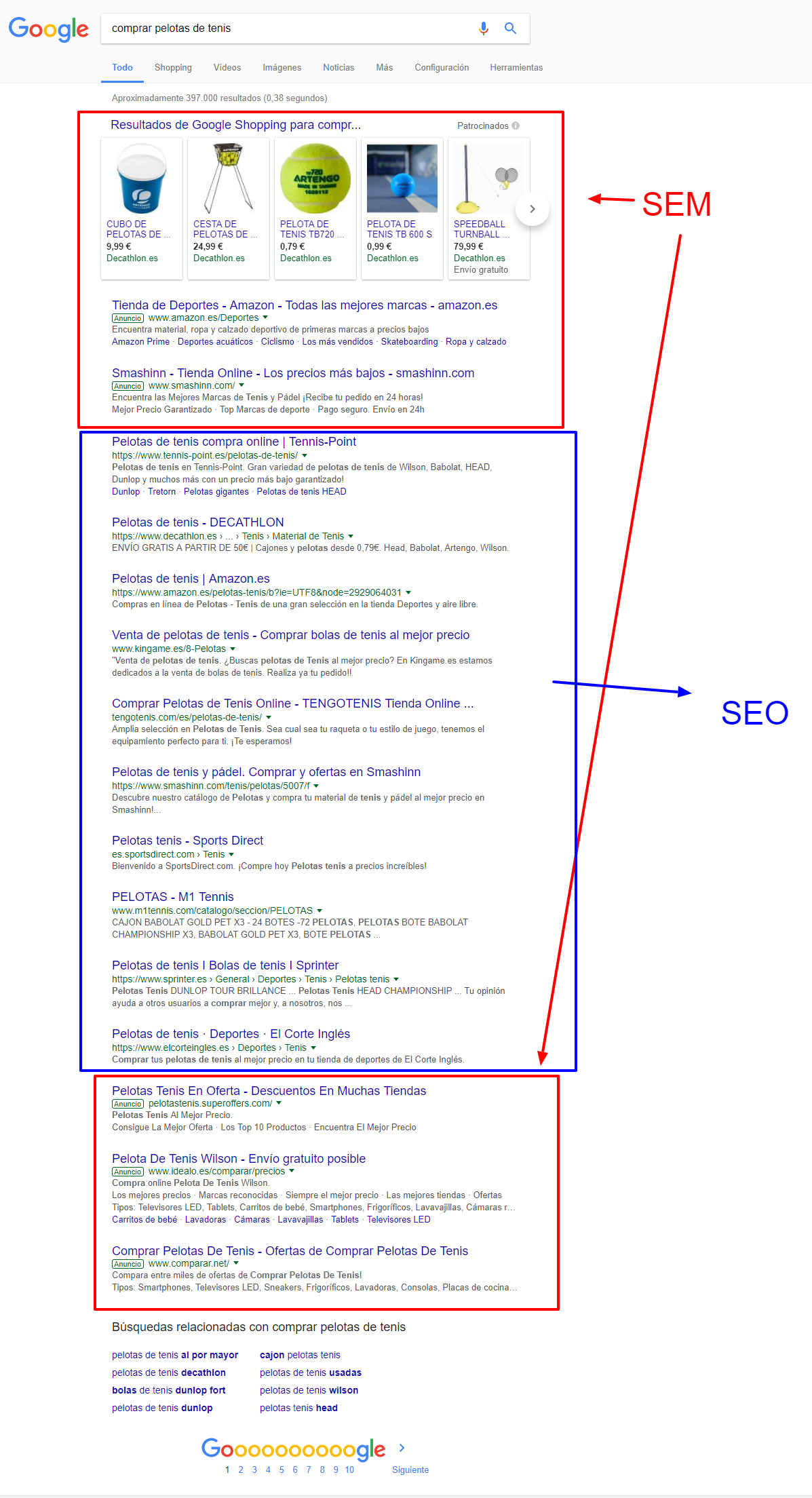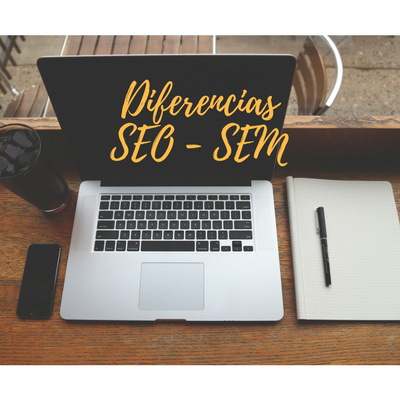Written by Maite Beltrán
Index
Nowadays I realize that when I talk to people who are not “in this world” but have heard about SEO and SEM, they still don’t know the difference between one and the other.
In this article I will try to explain in a simple way the difference between SEO and SEM positioning. Let’s start by defining them.
What is SEO and SEM positioning
– SEM: refers to Search Engine Marketing, which translates to search engine marketing (Google, Yahoo, Bing, etc).
SEM is the paid search engine results that appear in the first positions in a search and in which the advertiser is charged a cost per click when the user clicks. Depending on how much you bid, you may appear at the top or at the bottom of the page.
We often refer to SEM as paid search engine optimization. Why? Because you have to pay the tool through which you advertise. Once you have created the campaigns for your business and the ads, every time these appear in the searches and a user clicks, you will be charged an “X” amount for being able to take that user to your website and have the possibility of purchasing your products/services.
As mentioned above, there are different search engines where we can create and manage our ads, but undoubtedly the best known and most widely used is the platform belonging to the almighty Google: Adwords. With Adwords you can create campaigns and ads that will allow you to appear in Google searches immediately. However, do not think that by creating your campaigns and your ads and selecting the keywords you have done everything. Campaigns require knowledge of the tool and continuous monitoring to get the most out of them. The same would be true for the rest of the search engines.
– SEO: Search Engine Optimization. Translated it would be search engine optimization.
SEO or web positioning encompasses the work that is done on a website and its contents so that search engines find it and detect if it is relevant enough to show it to the user. The main objective is, of course, to appear in the first positions for the majority of searches that users can do related to your products, services and/or contents.
By achieving this, we will have greater visibility, which means more visits from people who are looking for exactly what you offer. Better positioning usually comes with more qualified traffic and visitors who are more likely to make a purchase or hire your services.
Also known as organic positioning, like SEM, it is better to leave it in the hands of professionals if we do not have a mastery of this discipline.
Main differences between SEO and SEM positioning
Time period
One of the main differences can be found in the time period involved in each. SEM is always more immediate, since we can create campaigns today and start appearing in the results. It is also true and must be taken into account that if you stop investing in SEM, you stop appearing.
In SEO, results are usually seen in the medium to long term, but it is easier to keep up if you follow a good strategy.
Visibility
Following the trail of time, we have the visibility offered by each one. In SEM we can start in the first positions almost overnight, while in SEO nobody can guarantee you to appear in the first results.
It can take months or even more than a year depending on many factors. However, as I have said, if you have a good strategy, it is not impossible and once you get there you can stay there for a long time.
Level of control over the strategy
At SEM is easier to have in a control of everything that is happening, we can set what we want to spend and not go beyond that, we can activate and pause campaigns whenever we want, create new ones, add and remove keywords, create new ads, generate specific landing pages that specifically match our objective, etc.
In SEO, there is control over the strategy, but not over the results. It is necessary to follow up and see “what is happening”, how the changes we are making are affecting us and if we are on the right track. It allows us less control.
However, as a warning, both strategies are affected by many factors and you can never have everything 100% under control. If we do our job well, then the results should be good.
4. Measuring results
In relation to the level of control, we can talk about measurement.
Measuring results is a bit more complicated in SEO, but quite accurate. It is true that if we relate it to sales it is more complicated (although not impossible) and in the case where the direct benefit is not the sale, it is just as difficult or easy to measure SEO and SEM.
Nevertheless, in SEM, we can have a lot of information. Thanks to the Google Ads platform itself and additional tools, we can learn about users’ searches, how they look for us, what interests them most, what sells more or sells less, what works in the campaigns and what needs to be improved, etc.
5. Cost
In SEM, as we have already mentioned, we have to pay the search engine tool to create our promotional campaigns, while in SEO or organic/natural positioning the results are based on the search engine’s impartial algorithm and do not involve investment in the search engine itself.
This does not mean that organic SEO is free as many people think or call it. If we want to carry out a good SEO strategy, we will have to hire the services of a specialized agency or consultant, therefore, it is not free.
6. Key words
In SEO the number of keywords we can choose to position ourselves, especially at the beginning of the strategy is limited, since it depends on our objectives, the content of the web, the number of pages that the site has. On the contrary, in SEM we can choose as many keywords as we want.
7. Changes and optimizations
Another difference in these strategies comes when it comes to making changes. SEO is less flexible to changes, that is, for a change to take effect it can take days or weeks, because once the change is made it will be necessary that this change is tracked and the page is updated on the servers, so we can not be making changes every day.
It is advisable to keep adjusting the strategy, and if it is well worked, it will last longer.
In SEM, any changes to campaigns are more immediate. You can change the text of the ads, keyword matches, insert new keywords, pause the ones that do not work, change the bids…
It is necessary to follow a strategy and keep testing, since not everything we put into practice will always work, but once we find our strong point, it can give us a lot of valuable information to continue growing.
8. Contents
Normally the contents we write for SEM have to have a very specific objective, match the structure of the campaigns, the keywords and have a much more commercial and sales-focused “touch” to attract potential customers. A landing page for SEM must be focused on sales, without too many distractions so that the user does not get lost and performs the action that interests us, such as: filling out a form, calling, requesting a quote, registering on the website, etc.
In the case of SEO, content must be highly relevant. This does not imply that they should not be focused on sales, but it is convenient to have more extensive, quality contents that really bring something new and interesting to our reader/customer.
Which is better, SEO or SEM?
Neither one is better, nor the other is worse, they are different and complementary strategies.
It is really advisable to start with both at the same time, so that, if your business is new, or you have never tried to promote it, the sem will help you to appear quickly, while the seo strategy will gradually make you appear in better positions, so that at some point you can combine on the same page several results of your business through ads and through organic positioning.
Why is it positive? Because most users do not go beyond the first page in a search and if we manage to have 2 or more results on the first page, it will be much easier to end up entering your website and there will be a greater chance of conversion.
Are you going for SEO, SEM, or both?

